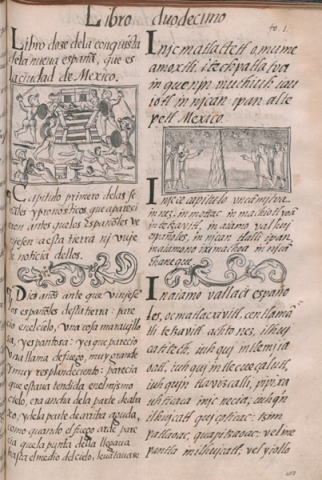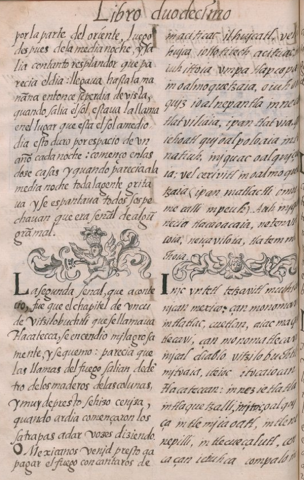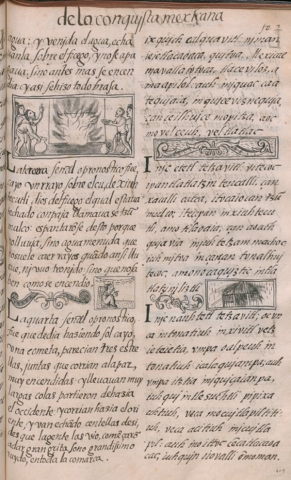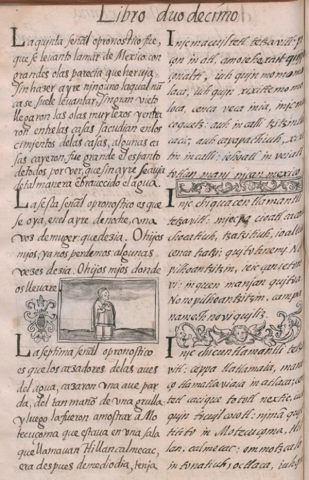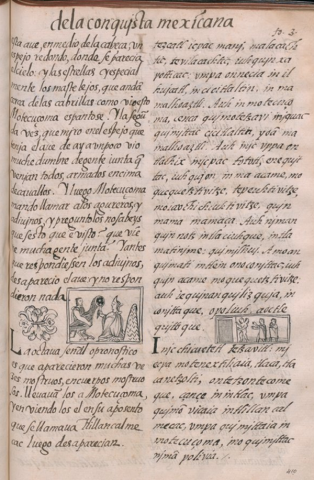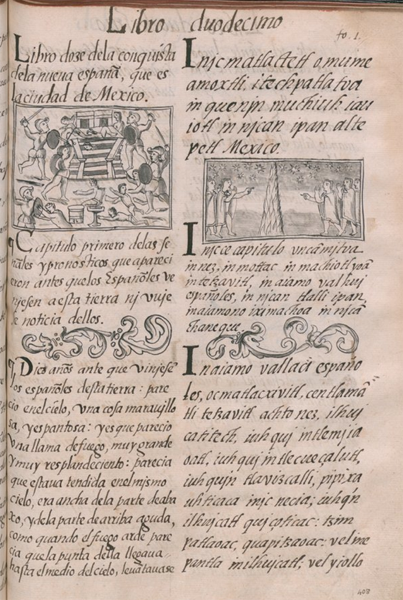 |
[Transcription of the Nahuatl (right-hand column) by James Lockhart:]
[f. 1r.] Inic matlactetl omume amoxtli, itechpa tlatoa inquenin muchiuh iauiotl in nican ipan altepetl Mexico.
Inic ce capitulo vncā mitoa in nez, in mottac in machiotl yoā in tetzavitl, in aiamo valhui españoles, in nican tlalli ipan, in aiamo no iximachoa in nicā chaneque.*
In aiamo vallaci españoles, oc matlacxivitl, centlamātli tetzavitl achto nez, ilhuicatitech, iuhqui in tlemiiaoatl, iuhqui in tlecueçalutl, iuhquin tlavizcalli, pipixauhticaca inic necia; iuhq’n ilhuicatl quiçoticac: tzimpatlaoac, quapitzaoac: vel inepantla in ilhuicatl; vel yiollo
----------
*NICĀ CHANEQUE. Possibly the intention here, as in the Spanish version, is that the Spaniards were not known by the local people. My translation is guided by the fact that nonactive verbs in Nahuatl do not specify an agent. Perhaps, however, the phrase “in nicā chaneque” is an implicit dative: “[the Spaniards] were not known [to] the people who live here.”
|
[Translation of the Nahuatl (right-hand column) by James Lockhart:]
Twelfth book, which speaks of how war was waged here in the altepetl of Mexico.
First chapter, where it is said that before the Spaniards came here to this land, and before the people who live here were known, there appeared and were seen signs and omens.
Ten years before the arrival of the Spaniards an omen first appeared in the sky, like a flame or tongue of fire, like the light of dawn. It appeared to be throwing off [sparks] and seemed to pierce the sky. It was wide at the bottom and narrow at the top. It looked as though it reached the very middle
[Translation of the Spanish (left-hand column) by James Lockhart:]
Book Twelve, of the conquest of New Spain, that is, of the City of Mexico.
First Chapter, of the signs and omens that appeared before the Spaniards came to this land or had been heard of.
Ten years before the Spaniards came to this land there appeared in the sky something marvelous and frightful. It was that a tongue of flame appeared, very large and resplendent; it seemed to be suspended in the very sky. It was wide below and pointed above; when the fire burned it seemed that the tip of it reached the middle of the sky. It would rise
|
[Translation of the Nahuatl into Spanish by Fr. Bernardino de Sahagún; transcription of the Spanish (left-hand column) by James Lockhart:]
[f. 1r.] Libro doze de la conquista de la nueua españa, que es la ciudad de Mexico.
Capitulo primero de las señales y pronosticos que aparecieron antes que los Españoles viniesen a esta tierra ni vuiese noticia dellos.
Diez años que vienesē los españoles desta* tierra: parecio en el cielo, vna cosa marauillosa, y espantosa: y es que parecio vna llama de fuego, muy grande y muy resplandeciento: parecia que estaua tendida en el mismo cielo, era ancha de la parte de abaxo, y de la parte de arriba aguda, como quando el fuego arde parecia que la punta della llegaua hasta el medio del cielo, leuātauase
----------
*DESTA. For "a esta."
|
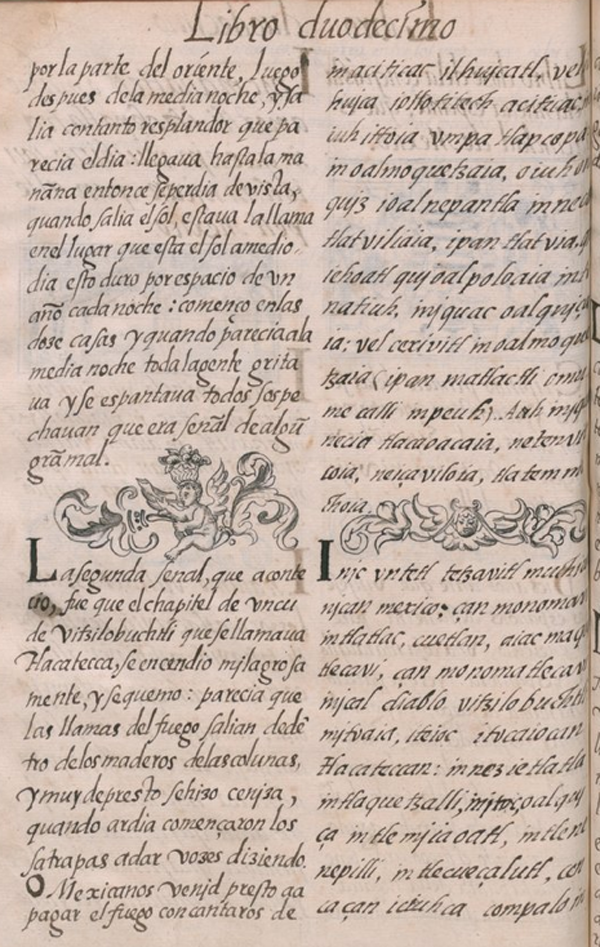 |
[Transcription of the Nahuatl (right-hand column) by James Lockhart:]
[f. 1v.] in aciticac ilhuicatl, vel ilhuicaiollotitech aciticac, in iuh ittoia vmpa tlapcopa: in oalmoquetzaia, oiuh onquiz ioalnepantla in necia tlatviliaia, ipan tlatvia, q’n iehoatl quioalpoloaia in tonatiuh, in iquac oalquiçaia: vel ce xivitl in oalmoquetzaia (ipan matlactli omume calli in peuh). Auh in iquac necia tlacaoacaia, netenvitecoia, neiçaviloia, tlatemma*
Inic vntetl tetzavitl muchiuh, nican mexico: çan monomavi in tlatlac, cuetlan, aiac ma quitlecavi, çan monomatlecavi in ical diablo vitzilobuchtli: mitoaia, iteioc** itocaiocan Tlacateccan: in nez ie tlatla in tlaquetzalli, initoc, oalquiça in tlemiiaoatl, in tlenenepilli, in tlecueçalutl, cenca çan iciuhca compalo in
----------
*TLATEMMA. Read “tlatemmachoia.” See Sahagún 1950-1982: 13.2. Although the verb often means "to be lazy, inactive," and so appears later in the text, here its second meaning, “to tell one’s troubles,” seems more apt. When I say “read” in relation to Nahuatl passages, I am fairly confident that the following form was the intention of the writer. Such is not the case with the readings offered for dubious, deficient, or deviant forms in the Spanish text.
**ITEIOC. This form, which would be “his rock (inalienable, locative),” is a mistake for “itepeioc,” “his mountain”; Sahagún 1950-1982: 13.2, points out that the Real Palacio manuscript in fact has “itepeyoc.”
|
[Translation of the Nahuatl (right-hand column) by James Lockhart:]
of the sky, its very heart and center. It showed itself off to the east. When it came out at midnight it appeared like the dawn. When dawn came, then the sun on coming out effaced it. For a full year it showed itself (it was in [the year] Twelve House that it began). And when it would appear there was an outcry, and people would hit their hands against their mouths as they yelled. People were taken aback, they lamented.
The second omen that happened here in Mexico was that of its own accord the house of the devil Huitzilopochtli, what they call his mountain, named Tlacateccan, burned and flared up; no one set fire to it, it just took fire itself. When the fire was seen, the wooden pillars were already burning. Tongues and tassels of flame were coming from inside; very quickly they consumed
[Translation of the Spanish (left-hand column) by James Lockhart:]
in the east, right after midnight, and it came out with such splendor that it seemed to be daytime; it continued until morning, then it was lost from view. When the sun rose, the flame was in the place where the sun is at midday. This lasted for a year, every night, beginning in Twelve House. When it appeared at midnight, all the people would shout and take fright; everyone suspected that it was a sign of some great evil.
The second sign that occurred was that the ornamented pillar of a cu [temple] of Huitzilopochtli, called Tlacateccan, miraculously took fire and burned. The tongues of flame seemed to come from inside the wooden columns, and when it burned it quickly turned to ashes. The satraps [priests] began to shout, saying “O Mexica, come quickly to put out the fire with jars of
|
[Translation of the Nahuatl into Spanish by Fr. Bernardino de Sahagún; transcription of the Spanish (left-hand column) by James Lockhart:]
[f. 1v.] por la parte del oriente, luego despues de la media noche, y salia con tanto resplandor que parecia el dia; llegaua hasta la mañana enconce se perdia de vista, quando salia el sol, estaua la llama en el lugar que esta el sol a mediodia esto duro por espacio de vn año cada noche: començo en las doze casas y quando parecia a la medianoche toda la gente gritaua y se espantaua todos sospechauan que era señal de algū grā mal.
La segunda senal,* que acontecio, fue que el chapitel** de un cu de vitzilobuchtli que se llamaua Tlacatecca, se encendio milagrosamente, y se quemo: parecia que las llamas del fuego salian de dētro de los maderos de las colunas, y muy de presto se hizo ceniza, quando ardia començaron los satrapas a dar vozes diziendo. O Mexicanos venid presto a apagar el fuego con cantaros de
----------
*SENAL. For "señal." The omission of the tilde, probably a phenomenon of speech as well as of orthography, is quite common in the text and will not be noted henceforth.
**CHAPITEL. The word is defined as the head of a pillar, but the intention here seems to be the pillar itself, as in the Nahuatl.
|
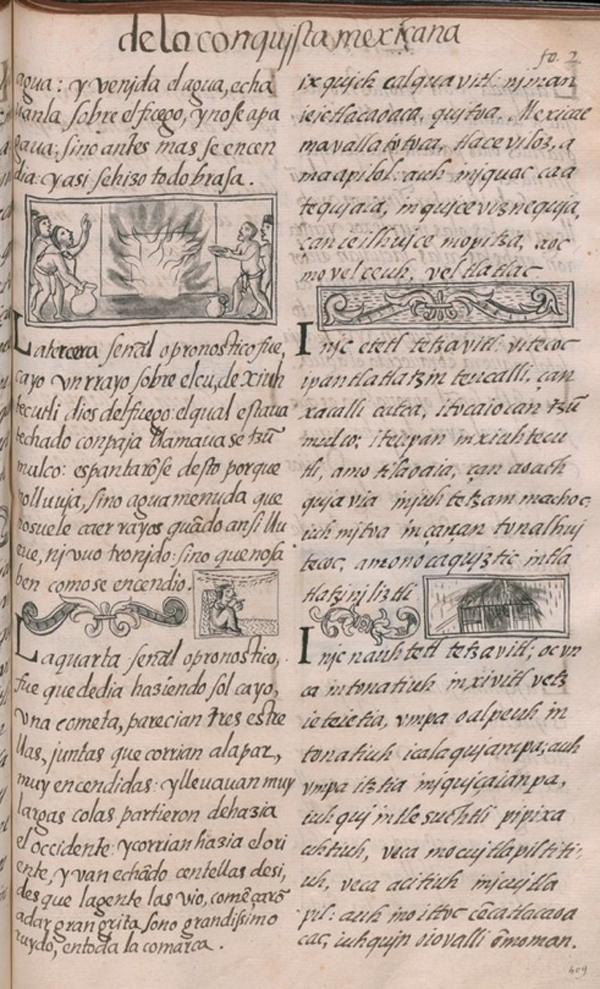 |
[Transcription of the Nahuatl (right-hand column) by James Lockhart:]
[f. 2r.] ixquich calquavitl: niman ie ic tlacaoaca, quitoa. Mexicae ma vallatotoca, tlaceviloz, amaapilol: auh in iquac caatequiaia, in quiceviznequia, çan ie ilhuice mopitza, aocmovel ceuh, vel tlatlac.
Inic etetl tetzavitl; vitecoc ipan tlatlatzin teucalli, çanxacalli catca, itocaiocan tzūmulco: iteupan in xiuhtecutli, amo tilaoaia, çan aoachquiavia in iuh tetzammachoc: iuh mitoa in çan* tonalhuitecoc, amo no caquiztic in tlatlatziniliztli.
Inic nauhtetl tetzavitl; oc vnca in tonatiuh in xivitl vetz ieteietia, vmpa oalpeuh in tonatiuh icalaquiampa; auh vmpa itztia in iquiçaianpa, iuhqui in tlesuchitli pipixauhtiuh, veca mocuitlapiltitiuh, veca acitiuh in icuitlapil: auh in oittoc cēca tlacaoacac, iuhquin oiovalli ōmoman.
----------
*ÇAN. The word is inadvertently repeated in the manuscript.
|
[Translation of the Nahuatl (right-hand column) by James Lockhart:]
all the building’s beams. Then there was an outcry. They said, “Oh Mexica, let everyone come running, it must be put out, [bring] your water jars!” But when they threw water on it, trying to extinguish it, it blew up all the more. It could not be put out; it burned entirely.
The third omen was that a temple was struck by lightning, hit by a thunderbolt. It was just a building of straw at the temple complex of Xiuhteuctli, called Tzonmolco. The reason it was taken for an omen was that it was not raining hard, just drizzling. It was said that it was struck when the sun was shining, nor was thunder heard.
The fourth omen was that while the sun was still out a comet fell, in three parts. It began off to the west and headed in the direction of the east, looking as if it were sprinkling glowing coals. It had a long tail, which reached a great distance. When it was seen, there was a great outcry, like the sound of rattles.
[Translation of the Spanish (left-hand column) by James Lockhart:]
water!" And when the water came, they threw it on the fire, but it did not go out; rather, it flamed up more, and thus it was all left in embers.
The third sign or omen was that a bolt of lightning struck the cu of Xiuhteuctli, god of fire, which was roofed with thatch; it was called Tzonmolco. They were shocked by it because there was no rain except a drizzle, and lightning does not usually strike when it rains in this fashion. Nor was there thunder, so that they do not know how it took fire.
The fourth sign or omen was that during the day, when the sun was out, a comet fell. Three stars appeared together, running along parallel, lit up very brightly and bearing large tails. They started to the west and ran toward the east; they went along casting off sparks. As soon as the people saw them, they began a great outcry; a huge noise sounded through the whole district.
|
[Translation of the Nahuatl into Spanish by Fr. Bernardino de Sahagún; transcription of the Spanish (left-hand column) by James Lockhart:]
[f. 2r.] agua; y venida el agua, echauanla sobre el fuego, y no se apagaua; sino antes mas se encendia; y asi se hizo todo brasa.
La tercera señal o pronostico fue, cayo un rrayo sobre el cu, de xiuhtecutli dios del fuego; el qual estaua techado con paja llamauase tzūmulco; espantarōse desto porque no lluuia, sino agua menuda que no suele caer rayos quādo ansi llueue, ni vuo tronido; sino que no saben como se encendio.
La quarta señal o pronostico, fue que de dia haziendo sol cayo, vna cometa, parecian tres estrellas, juntas que corrian a la par, muy encendidas: y lleuauan muy largas colas partieron de hazia el occidente: y corrian hazia el oriente, yvan echādo centellas de si, desque la gente las vio, comēçarō a dar gran grita sono grandissimo ruydo, en toda la comarca.
|
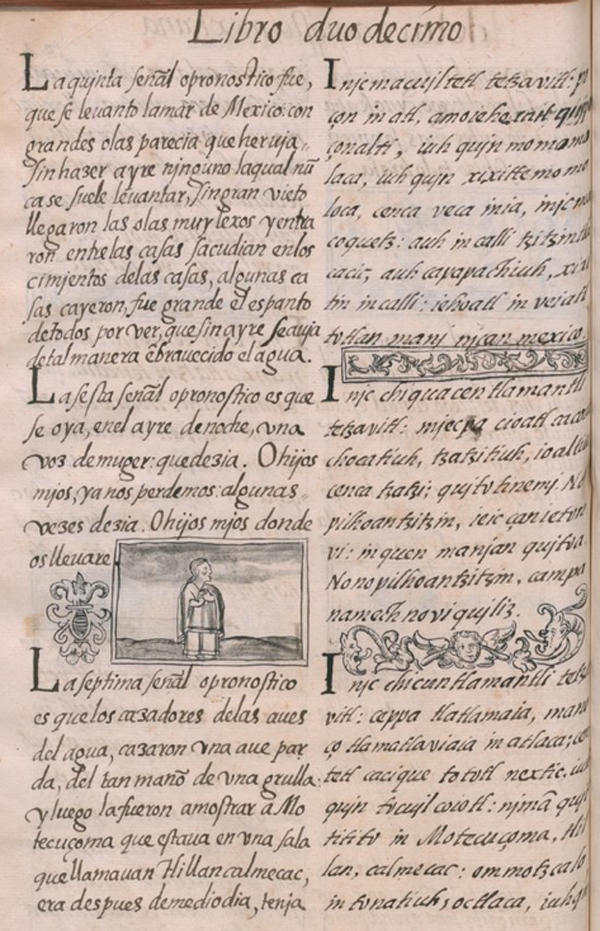 |
[Transcription of the Nahuatl (right-hand column) by James Lockhart:]
[f. 2v.] Inic macuiltetl tetzavitl: poçon in atl, amoiehecatl quipoçonalti, iuhquin momomoloca, iuhquin xixittemomoloca, cenca veca in ia, inic macoquetz: auhin calli tzitzintla cacic, auh capapachiuh, xixitin in calli: iehoatl in vei atl totlan mani nican mexico.
Inic chiquacentlamantli tetzavitl: miecpa cioatl cacoia chocatiuh, tzatzitiuh, ioaltica cenca tzatzi; quitotinemi. No nopilhoantzitzin, ie ic çan ie tonvi: in quenmanian quitoa. No nopilhoantzitzin, campa namechnoviquiliz.
Inic chicuntlamantli tetzavitl: ceppa tlatlamaia, manoço tlamatlaviaia in atlaca; centetl cacique tototlnextic, iuhquin tocuilcoiotl: nimā quittitito in Motecuçoma, tlillan, calmecac: ommotzcalo* in tonatiuh, oc tlaca, iuhq’n
---------
*OMMOTZCALO. Forms related to itzcalli have the meaning “high” as well as “sideways, inclined.”
|
[Translation of the Nahuatl (right-hand column) by James Lockhart:]
The fifth omen was that the water [of the lake] boiled up; it was not the wind that caused it. It bubbled and made exploding sounds, rising high in the air. It reached the foundations of the houses; it flooded them, and they collapsed. This is the great lake that extends around us here in Mexico.
The sixth omen was that many times a woman would be heard going along weeping and shouting. She cried out loudly at night, saying, “Oh my children, we are about to go forever.” Sometimes she said, “Oh my children, where am I to take you?”
The seventh omen was that once the water folk were hunting or snaring and caught an ash-colored bird, like a crane. Then they went to the Tlillan calmecac to show it to Moteucçoma; the sun was inclining, it was still full day. On top of its head was something like
[Translation of the Spanish (left-hand column) by James Lockhart:]
The fifth sign or omen was that the sea [lake] of Mexico rose up with great waves. It seemed to boil, although there was no wind and it ordinarily never rises without strong winds. The waves reached a great distance and came in among the houses, shaking their foundations, and some houses fell. Great was the fright of all to see that without wind the water should have become so wild.
The sixth sign or omen is that in the night air the voice of a woman was heard, saying, "O my children, we are about to be lost." Sometimes she said, "O my children, where am I to take you?"
The seventh sign or omen is that the hunters of waterfowl caught a dark bird the size of a crane, and then they went to show it to Moteucçoma, who was in a hall that they called Tlillan calmecac. This was after midday.
|
[Translation of the Nahuatl into Spanish by Fr. Bernardino de Sahagún; transcription of the Spanish (left-hand column) by James Lockhart:]
[f. 2v.] La quinta señal o pronostico fue, que se leuanto la mar de Mexico: con grandes olas parecia que heruia sin hazer ayre ninguno la qual nūca se suele leuantar, sin gran vieto llegaron las olas muy lexos y entraron entre las casas, algunas casas cayeron, fue grande el espanto de todos por ver, que sin ayre se auia de tal manera ēbrauecido el agua.
La sesta señal o pronostico es que se oya, en el ayre de noche, vna voz de muger: que dezia. O hijos mios, ya nos perdemos: algunas vezes dezia. O hijos mios donde os lleuare.
La septima señal o pronostico es que los cazadores de las aues del agua, cazaron vna aue parda, del tanmaño* de vna grulla: y luego fueron a mostrar a Motecuçoma que estaua en vna sala que llamauan Tlillancalmecac, era despues de mediodia tenia
----------
*TANMANO. For "tamaño." The insertion of a syllable-final n is rarer in this text than the omission of one, but in Nahuatl writing in general it is a very common phenomenon. Some cases in this text have to do with the confusion between verbal singulars and plurals. Henceforth, inserted n will not be noted.
|
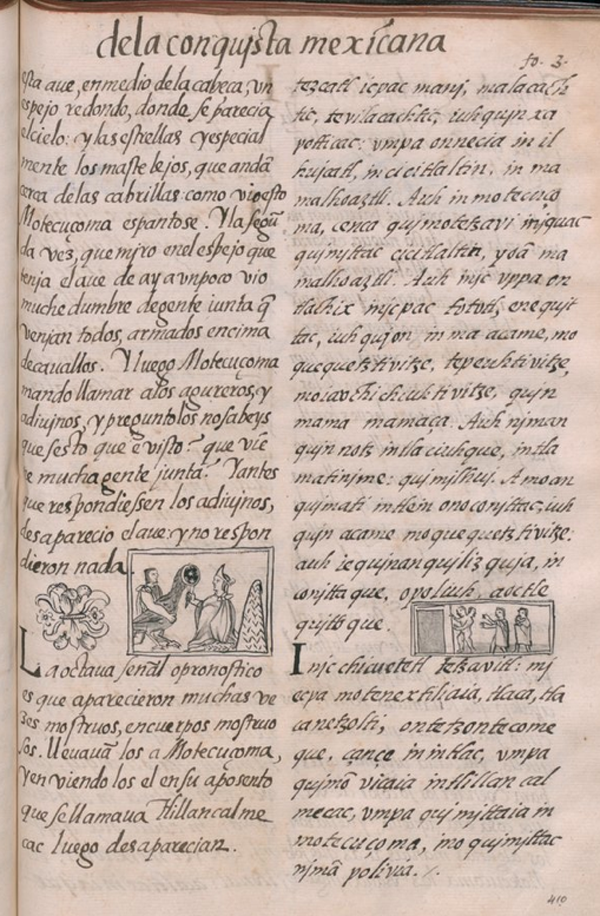 |
[Transcription of the Nahuatl (right-hand column) by James Lockhart:]
[f. 3r.] tezcatl icpac mani, malacachtic, tevilacachtic, iuhquin xapotticac: vmpa onnecia in ilhuicatl, in cicitlaltin, in mamalhoaztli. Auh in motecuçoma, cenca quimotetzavi in iquac quimittac cicitlaltin, yoā mamalhoaztli. Auh inic vppa ontlachix in icpac tototl, ene quittac, iuhqui on in ma acame, moquequetztivitze, tepeuhtivitze, moiaochichiuhtivitze, quinmama mamaça. Auh niman quinnotz in tlaciuhque, in tlamatinime: quimilhui: Amo anquimati in tlein onoconittac, iuhquin acame moquequetztivitze: auh ie quinanquilizquia, in conittaque, opoliuh, aoctle quitoque.
Inic chicuetetl tetzavitl: miecpa motenextiliaia, tlaca,tlacanetzolti, ontetzontecomeque, çan çe in intlac, vmpaquimōvicaia in tlillan calmecac, vmpa quimittaia in motecuçoma, in oquimittac nimā polivia./.
|
[Translation of the Nahuatl (right-hand column) by James Lockhart:]
a mirror, round, circular, seeming to be perforated, where the sky, the stars, and the Fire Drill [constellation] could be seen. And Moteucçoma took it for a very bad omen when he saw the stars and the Fire Drill. The second time he looked at the bird’s head he saw something like a multitude of people coming along, coming bunched, outfitted for war, carried on the backs of deer. Then he called the soothsayers, the sages, and said to them, “Do you not know what I’ve seen, something like a multitude of people coming along?” But when they were going to answer him, what they saw disappeared, and they said nothing more.
The eighth omen was that many times people appeared, thistle-people with two heads but one body; they took them to the Tlillan calmecac and showed them to Moteucçoma. When he had seen them, they disappeared.
[Translation of the Spanish (left-hand column) by James Lockhart:]
This bird had in the middle of its head a round mirror in which appeared the sky and the stars, especially Castor and Pollux, which move close to the Pleiades. When Moteucçoma saw this, he took fright. The second time he looked in the mirror on the bird, a little later, he saw a multitude of people all coming along together, armed and on horseback. Then Moteucçoma ordered the soothsayers and prognosticators to be called, and he asked them, "Do you not know what this is that I have seen? For many people are coming together." But before the prognosticators could answer, the bird disappeared, and they gave no reply.
The eighth sign or omen is that many times monsters appeared, in monstrous bodies. They took them to Moteucçoma, and after he had seen them in his lodging, called Tlillan calmecac, they immediately disappeared.
|
[Translation of the Nahuatl into Spanish by Fr. Bernardino de Sahagún; transcription of the Spanish (left-hand column) by James Lockhart:]
[f. 3r.] esta aue, en medio de la cabeça, vn espejo redondo, donde se parecia el cielo: y las estrellas y especialmente los mastelejos,* que andā cerca de las cabrillas: como vio esto Motecuçoma espantose. Y la segūda vez, que miro en el espejo que tenia el aue de ay a vn poco vio muchedumbre de gente iunta q’ venian todos, armados encima de cauallos. Y luego Motecuçoma mando llamar a los agureros, y adiuinos, y preguntolos no sebeys ques esto que e visto? que viene mucha gente junta? Y antes que respondiessen los adiuinos, desparecio el aue: y no respondieron nada.
La octaua señal o pronostico es que aparecieron muchas vezes mostruos, en cuerpos mostruosos. lleuauālos a Motecuçoma, y en viendolos el en su aposento que se llamaua Tlilancalmecac luego desaparecian.
[Standardized transcription of the Spanish by Stephanie Wood:]
esta ave, en medio de la cabeza, un espejo redondo, donde se parecía el cielo y las estrellas y especialmente los astillejos que andan cerca de las cabrillas, como vio esto Motecuzoma espantose. y la segunda vez que miró en el espejo que tenía el ave de allí a un poco muchedumbre de gente yunta que venían todos armados encima de caballos. Y luego Motecuzoma mandó llamar a los agureros y adivinos, y preguntolos no sebeis que es esto que he visto? que viene mucha gente junta? Y antes que respondiesen los adivinos, desapareció el ave y no respondieron nada.
La octava señal o pronóstico es que aparecieron muchas veces monstruos, en cuerpos monstruosos. Llevábanlos a Motecuzoma y en viéndolos el en su aposento que se llamaba Tlilancalmecac luego desparecían.
----------
*MASTELEJOS. For "astillejos."
|
